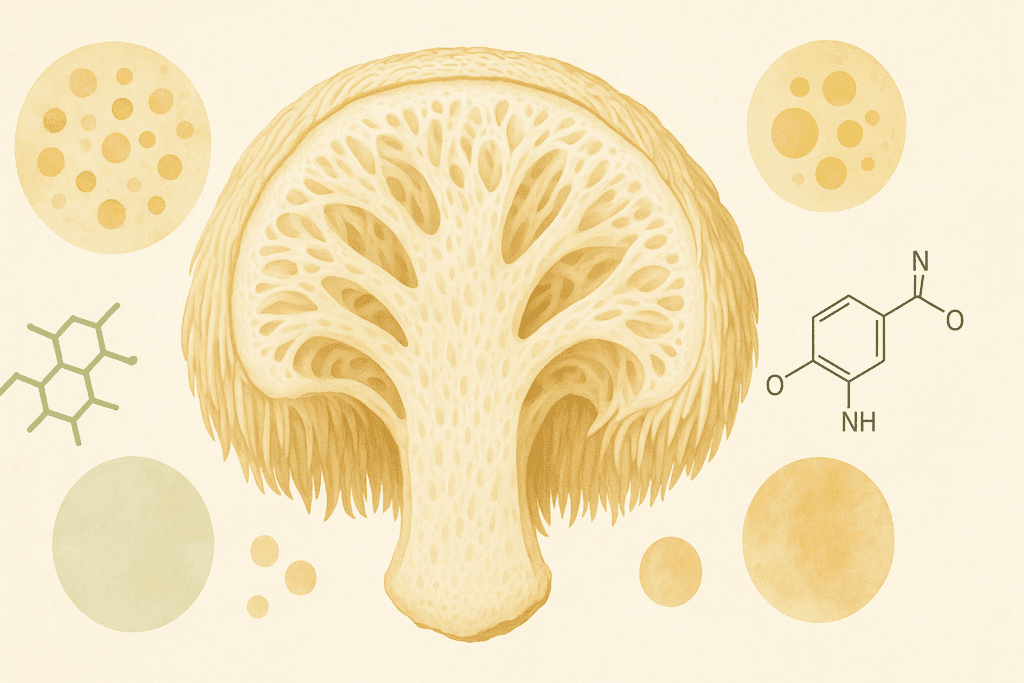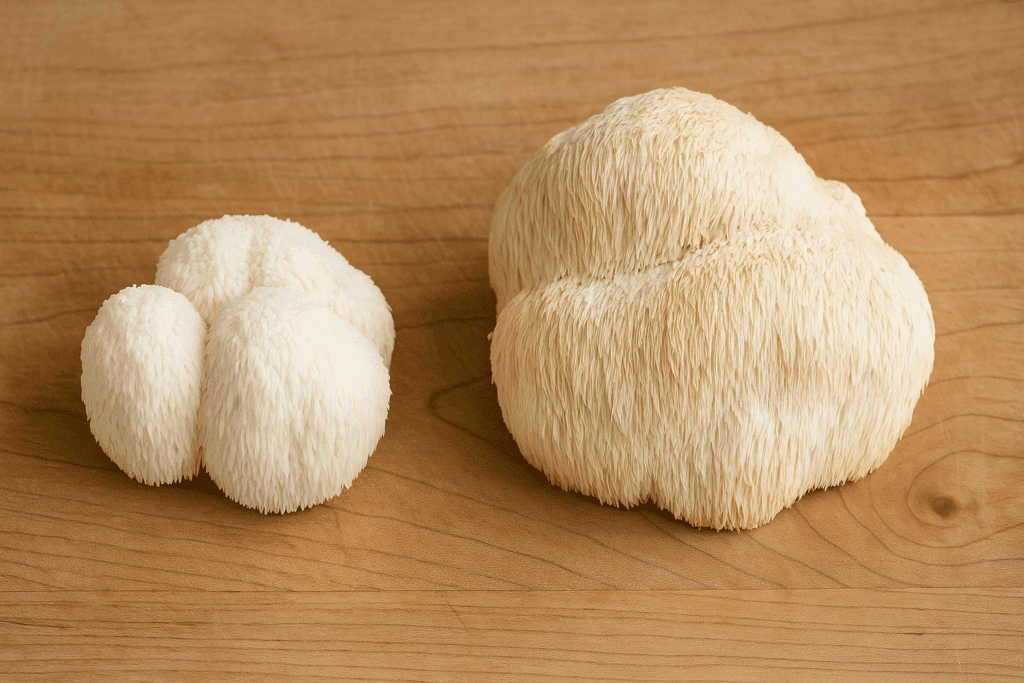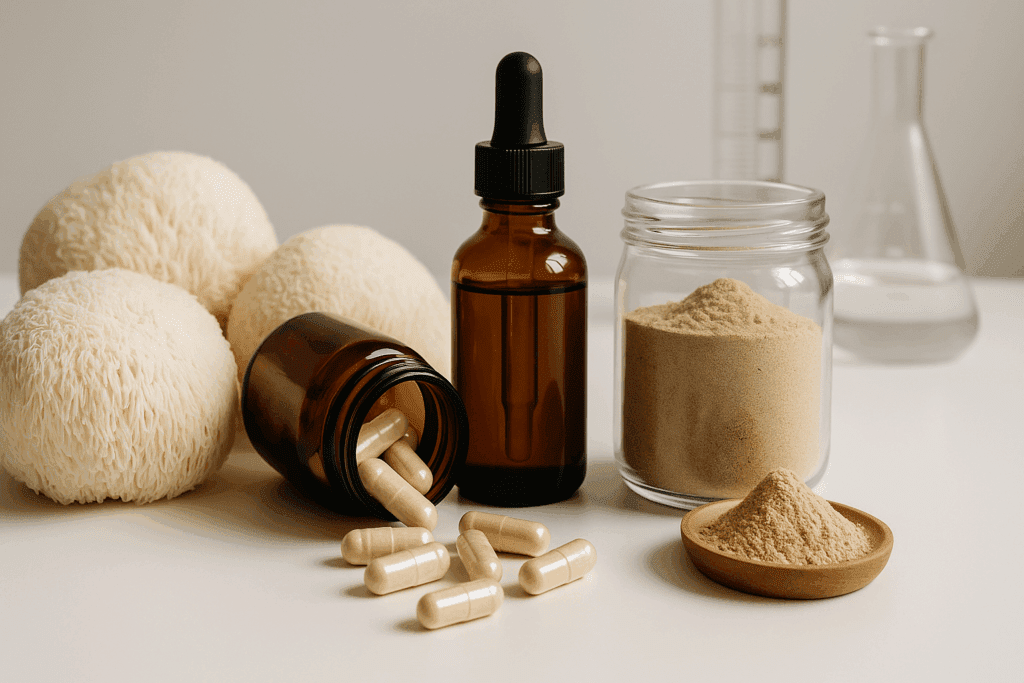Introduction: Understanding the Growing Fascination with Young Lion’s Mane Mushroom
In the evolving world of natural nootropics, few ingredients have garnered as much attention as Lion’s Mane mushroom. Yet within this realm, an even more intriguing focus has emerged: the remarkable properties of young Lion’s Mane mushroom. As consumers and researchers alike turn their gaze toward earlier stages of the mushroom’s life cycle, a rich field of discovery unfolds. Early harvesting, it seems, may unlock unique compounds and biological activities that support brain health and cognitive vitality in ways that mature specimens cannot match. This emerging interest is reshaping how we approach supplementation, cognitive enhancement, and even preventative brain health strategies.
You may also like: How Lion’s Mane Supplements May Support ADHD and Cognitive Clarity: What Science Says About Lions Mane for Focus and Brain Health
The surge of curiosity about young Lion’s Mane is not without scientific backing. Studies suggest that certain bioactive components, such as hericenones and erinacines, are present in higher concentrations when the mushroom is harvested early. These compounds have been linked to neurogenesis, enhanced memory, and the protection of existing neural networks. Understanding the benefits of young Lion’s Mane mushroom requires a deeper look into its chemistry, its physiological effects, and the reasons why early harvesting could prove advantageous. This article delves into these critical insights, guiding readers through a nuanced, scientifically informed exploration of how young Lion’s Mane mushroom can be a valuable ally in promoting lasting cognitive health.
The Distinct Composition of Young Lion’s Mane Mushroom
Harvesting Lion’s Mane mushroom at a young stage significantly alters its chemical profile. Unlike fully mature specimens, young Lion’s Mane mushrooms contain a denser concentration of low-molecular-weight compounds, which are believed to cross the blood-brain barrier more efficiently. In particular, the levels of erinacine A, a diterpenoid known for stimulating Nerve Growth Factor (NGF) synthesis in the brain, are often elevated in younger mushrooms. This difference in chemical composition is not merely academic; it has tangible implications for how the mushroom interacts with human biology.
The polysaccharides found in young Lion’s Mane mushroom also differ from those present at maturity. Early-stage polysaccharides tend to be less complex and more readily bioavailable, which can enhance absorption and efficacy in the body. In addition, antioxidant concentrations are often higher during the early growth phases, providing greater defense against oxidative stress — a key factor in neurodegeneration. These distinctive characteristics set the stage for young Lion’s Mane to potentially outperform its older counterparts in promoting brain health.
Another noteworthy aspect is the balance of phenolic compounds and flavonoids found in young Lion’s Mane mushroom. These antioxidants contribute not only to cellular protection but also to the modulation of inflammatory pathways associated with cognitive decline. The interplay of these chemical elements provides a strong foundation for the mushroom’s reputation as a cognitive enhancer and neuroprotectant, offering a compelling reason to explore early harvesting as a standard practice in supplement production.

How Early Harvesting Enhances Cognitive Benefits
When Lion’s Mane is harvested young, it retains higher concentrations of neuroactive compounds critical for brain function. Erinacines, in particular, have been demonstrated in animal models to cross into the central nervous system and stimulate NGF synthesis, which plays a crucial role in the survival, maintenance, and regeneration of neurons. By boosting NGF production, young Lion’s Mane mushroom may help to protect against neurodegenerative diseases such as Alzheimer’s, support recovery from brain injuries, and promote overall cognitive resilience.
Moreover, young Lion’s Mane has been associated with improved synaptic plasticity, the brain’s ability to reorganize itself by forming new neural connections. Enhanced synaptic plasticity is linked to better learning outcomes, memory retention, and emotional regulation. These effects are vital not only for aging populations seeking to preserve mental acuity but also for younger individuals aiming to optimize cognitive performance in professional and academic settings.
Early-harvested Lion’s Mane may also contribute to enhanced cerebral blood flow. Preliminary research suggests that certain compounds abundant in younger mushrooms help to relax blood vessels and support microcirculation within the brain. Improved blood flow ensures that neurons receive adequate oxygen and nutrients, promoting overall brain vitality. This multifaceted support makes young Lion’s Mane mushroom a particularly attractive option for individuals seeking comprehensive cognitive benefits.
Comparing Young and Mature Lion’s Mane Mushrooms
The contrast between young Lion’s Mane and mature specimens extends beyond chemical composition to functional outcomes. Mature Lion’s Mane mushrooms, while still beneficial, often display lower levels of NGF-stimulating compounds and a higher proportion of fibrous material. This can impact not only the mushroom’s neurogenic potential but also its digestibility and bioavailability. In contrast, young Lion’s Mane offers a more concentrated, easily absorbed package of cognitive-supporting nutrients.
Mature Lion’s Mane mushrooms are prized for their culinary appeal, offering a meaty texture and a savory flavor profile. However, when the goal is cognitive enhancement rather than culinary enjoyment, the younger form appears to have a distinct advantage. Supplement formulations that prioritize young Lion’s Mane extracts may provide a higher potency per serving, leading to more noticeable improvements in focus, memory, and mental energy over time.
Another important distinction lies in the antioxidant profile. Although mature mushrooms contain antioxidants, young Lion’s Mane mushrooms often demonstrate superior activity in neutralizing free radicals. This heightened antioxidant action is critical for protecting brain cells from oxidative damage, a primary driver of age-related cognitive decline. By choosing supplements derived from early-harvested Lion’s Mane, consumers may gain an edge in safeguarding their long-term brain health.

The Science Behind Neurogenesis and Young Lion’s Mane Mushroom
One of the most exciting areas of research surrounding young Lion’s Mane mushroom is its potential role in promoting neurogenesis — the process by which new neurons are formed in the brain. Neurogenesis is fundamental to learning, memory, and emotional regulation, yet it declines naturally with age. The ability to stimulate this process offers a promising strategy for maintaining cognitive vitality throughout the lifespan.
Young Lion’s Mane mushroom’s higher erinacine content has been directly linked to enhanced neurogenic activity. Animal studies have shown that erinacines stimulate the production of NGF, which in turn supports the growth and differentiation of neurons. Additionally, early-stage polysaccharides may foster an environment conducive to neurogenesis by modulating inflammation and oxidative stress levels within the brain.
Beyond laboratory models, emerging human studies suggest that supplementation with Lion’s Mane extracts can lead to measurable improvements in cognitive function, mood, and even mild cognitive impairment. Although more research is needed to fully delineate the specific benefits of young Lion’s Mane mushroom in humans, the existing evidence is compelling. As understanding deepens, young Lion’s Mane may become an essential element in personalized strategies to promote lifelong brain health.

Optimizing Supplement Quality: What to Look for in Young Lion’s Mane Products
Not all Lion’s Mane supplements are created equal, and this is especially true when seeking the benefits of young Lion’s Mane mushroom. Consumers should prioritize products that specify early harvesting in their sourcing and processing methods. Ideally, reputable brands will highlight standardized erinacine and hericenone content, offering transparency about the potency and purity of their extracts.
Extraction methods also play a critical role. Dual-extraction processes, which involve both water and alcohol extraction, tend to yield a more complete spectrum of bioactive compounds. When evaluating young Lion’s Mane supplements, it is important to verify that both water-soluble polysaccharides and alcohol-soluble terpenoids have been preserved to maximize efficacy.
Furthermore, sourcing and cultivation practices matter immensely. Organically grown mushrooms, cultivated without the use of synthetic pesticides or heavy metals, ensure a cleaner end product. Given that young Lion’s Mane mushrooms are particularly rich in bioavailable compounds, ensuring that these compounds are not compromised during cultivation or processing is critical. Certifications such as USDA Organic or third-party testing for contaminants can offer additional assurance of product quality.

Potential Applications for Different Populations
The benefits of young Lion’s Mane mushroom extend across diverse populations, offering tailored advantages depending on individual cognitive goals and life stages. For older adults concerned with age-related cognitive decline, early-harvested Lion’s Mane may provide valuable support in preserving memory and executive function. The promotion of neurogenesis and the reduction of oxidative stress can contribute to healthier brain aging and improved quality of life.
Young professionals and students can also harness the power of young Lion’s Mane to boost mental clarity, creativity, and focus. By enhancing synaptic plasticity and supporting robust neural connections, this natural nootropic offers a non-stimulant alternative for optimizing mental performance without the crash associated with caffeine or synthetic enhancers.
Even individuals recovering from neurological injury or trauma may find young Lion’s Mane mushroom beneficial as part of a comprehensive recovery strategy. By stimulating nerve regeneration and reducing inflammation, it may complement other medical interventions designed to restore cognitive and motor function. While supplementation should never replace professional medical care, it can serve as a valuable adjunct in the healing process.

FAQ: Young Lion’s Mane Mushroom Benefits and Early Harvesting Insights
1. What makes young Lion’s Mane mushroom different from other nootropics?
Young Lion’s Mane mushroom stands apart from many conventional nootropics due to its natural ability to support neurogenesis through compounds like erinacines. Unlike synthetic nootropics, which often target neurotransmitter levels temporarily, young Lion’s Mane mushroom encourages the growth and repair of nerve cells at a foundational level. This regenerative focus may lead to more sustainable cognitive benefits over time. Furthermore, the early harvesting process captures peak concentrations of active compounds, offering a broader spectrum of brain-supportive elements than many lab-created alternatives. For those seeking long-term brain health without chemical dependence, young Lion’s Mane offers a uniquely holistic solution.
2. How does the cultivation environment affect the quality of young Lion’s Mane mushroom?
The cultivation environment profoundly influences the final potency of young Lion’s Mane mushroom. Mushrooms grown in controlled, organic environments tend to accumulate higher levels of bioactive compounds compared to those grown under industrial or outdoor conditions where stressors can hinder optimal growth. Light exposure, temperature fluctuations, and humidity all impact the density of key nutrients within young Lion’s Mane. Recent advances in vertical farming and bioreactor cultivation methods are helping to create ideal conditions for maximizing these compounds. When selecting supplements, sourcing information that highlights meticulous cultivation standards ensures consumers benefit fully from young Lion’s Mane’s natural potential.
3. Can young Lion’s Mane mushroom influence emotional resilience and stress response?
Emerging research suggests that young Lion’s Mane mushroom may indeed play a role in emotional regulation and resilience. By promoting nerve growth factor synthesis and supporting healthy brain plasticity, young Lion’s Mane can enhance the brain’s ability to adapt to stressors. Some studies even hint at mood-balancing effects, possibly through modulating inflammation and supporting serotonergic systems. While it should not be viewed as a standalone treatment for mood disorders, young Lion’s Mane offers a promising complementary approach to fostering emotional well-being. Regular use in supportive protocols may gradually enhance an individual’s resilience against daily stress.
4. Are there unique antioxidant properties specific to young Lion’s Mane mushroom?
Yes, young Lion’s Mane mushroom exhibits a distinct antioxidant profile compared to its mature counterpart. Early harvesting preserves higher concentrations of certain phenolic compounds and polysaccharides known for neutralizing free radicals. These antioxidants not only protect neurons from oxidative stress but may also help maintain mitochondrial function, which is critical for sustained cognitive energy. In an era when chronic inflammation is increasingly linked to cognitive decline, the antioxidant defense offered by young Lion’s Mane becomes even more valuable. Its proactive neuroprotection sets a strong foundation for healthy aging and cognitive longevity.
5. How does young Lion’s Mane mushroom fit into a long-term cognitive wellness plan?
Integrating young Lion’s Mane mushroom into a broader cognitive wellness strategy can yield profound benefits. Beyond acute nootropic effects, its long-term support of nerve growth and synaptic strength promotes cognitive reserve — the brain’s natural buffer against decline. Pairing young Lion’s Mane with practices like regular exercise, sleep optimization, and mindfulness creates a synergistic approach to brain health. It is important to think of young Lion’s Mane as a marathon companion rather than a sprint enhancer. Over months and years, consistent use may contribute meaningfully to cognitive clarity, emotional balance, and even creativity.
6. Could early harvesting practices for young Lion’s Mane influence sustainability?
Interestingly, early harvesting of young Lion’s Mane mushroom may enhance sustainability in the supplement industry. Younger mushrooms often require shorter cultivation cycles, which can reduce energy, water, and land resource use compared to fully mature harvests. This efficiency opens up opportunities for growers to produce potent, eco-conscious nootropic products without extensive environmental cost. Additionally, early harvests can enable year-round indoor cultivation, reducing the need for pesticide use and lowering the carbon footprint associated with transport. Choosing young Lion’s Mane products could become a mindful decision not only for personal health but also for planetary well-being.
7. Are there differences in how young Lion’s Mane and mature Lion’s Mane are metabolized by the body?
Emerging evidence suggests that young Lion’s Mane mushroom may be more readily absorbed and utilized by the body than mature Lion’s Mane. Due to its simpler polysaccharide structures and lower fibrous content, young Lion’s Mane breaks down more easily during digestion, potentially enhancing the bioavailability of its active compounds. This efficient metabolism may result in quicker and more pronounced cognitive benefits compared to mature forms. Furthermore, early-stage compounds seem to interact differently with gut microbiota, potentially fostering a healthier gut-brain axis — an exciting area of research connecting digestion and cognition. Optimizing for bioavailability is another reason why young Lion’s Mane stands out among brain health supplements.
8. Can young Lion’s Mane mushroom support creativity and divergent thinking?
Young Lion’s Mane mushroom’s effects on neuroplasticity suggest it may bolster not just memory and focus, but also creativity and divergent thinking. Enhanced neural connectivity, supported by early-stage compounds, facilitates novel associations between ideas — the core of creative cognition. Anecdotal reports from users indicate that regular supplementation with young Lion’s Mane leads to easier brainstorming, problem-solving, and innovation. Although scientific research is still developing in this niche area, preliminary findings are encouraging. For individuals in fields requiring original thinking, young Lion’s Mane mushroom could be a powerful addition to their cognitive toolkit.
9. What are future research directions for young Lion’s Mane mushroom?
Future studies on young Lion’s Mane mushroom are likely to explore its effects in clinical populations beyond cognitive decline, such as in post-stroke rehabilitation, mood disorders, and age-associated memory impairment. There is also growing interest in mapping its impact on specific brain regions through advanced imaging techniques. Researchers are keen to isolate which bioactive compounds drive different cognitive outcomes and how synergistic interactions among compounds may enhance efficacy. Additionally, investigations into the gut-brain axis may reveal new ways that young Lion’s Mane supports systemic wellness. These exciting avenues will only deepen our appreciation for the potential of young Lion’s Mane.
10. How can consumers ensure they are getting authentic young Lion’s Mane products?
Selecting high-quality young Lion’s Mane mushroom products requires discerning attention to sourcing and labeling. Look for brands that specify “early-harvested” or “young fruiting bodies” and provide transparent testing results for erinacine and hericenone content. Third-party lab certifications for purity and potency add an extra layer of trustworthiness. Consumers should be wary of blends that dilute young Lion’s Mane with cheaper, mature extracts unless explicitly labeled. Educating oneself about the cultivation and extraction methods used ensures that the benefits promised by young Lion’s Mane mushroom are actually delivered in the final supplement.

Conclusion: Embracing the Cognitive Power of Young Lion’s Mane Mushroom
The world of natural nootropics continues to expand, but few discoveries hold as much promise as the targeted use of young Lion’s Mane mushroom. Early harvesting appears to unlock a unique concentration of neuroactive compounds, antioxidants, and bioavailable polysaccharides that support brain health and cognitive vitality in profound ways. Whether for aging individuals seeking to maintain mental acuity, professionals striving for peak performance, or anyone committed to lifelong cognitive wellness, young Lion’s Mane offers a compelling, evidence-based option.
By choosing high-quality supplements derived from early-harvested specimens, consumers can ensure they are tapping into the full potential of this extraordinary mushroom. As research continues to unfold, young Lion’s Mane mushroom stands poised to redefine how we think about natural strategies for brain health — offering a path not only to sharper focus and memory today but to sustained cognitive resilience for years to come.
Further Reading:
Health Benefits of Lion’s Mane Mushrooms
What are the benefits of lion’s mane mushrooms?
Was this article helpful? Don’t let it stop with you. Share it right now with someone who needs to see it—whether it’s a friend, a colleague, or your whole network. And if staying ahead on this topic matters to you, subscribe to this publication for the most up-to-date information. You’ll get the latest insights delivered straight to you—no searching, no missing out.
.Important Note: The information contained in this article is for general informational purposes only, and should not be construed as health or medical advice, nor is it intended to diagnose, prevent, treat, or cure any disease or health condition. Before embarking on any diet, fitness regimen, or program of nutritional supplementation, it is advisable to consult your healthcare professional in order to determine its safety and probable efficacy in terms of your individual state of health.
Regarding Nutritional Supplements Or Other Non-Prescription Health Products: If any nutritional supplements or other non-prescription health products are mentioned in the foregoing article, any claims or statements made about them have not been evaluated by the U.S. Food and Drug Administration, and such nutritional supplements or other health products are not intended to diagnose, treat, cure, or prevent any disease.


